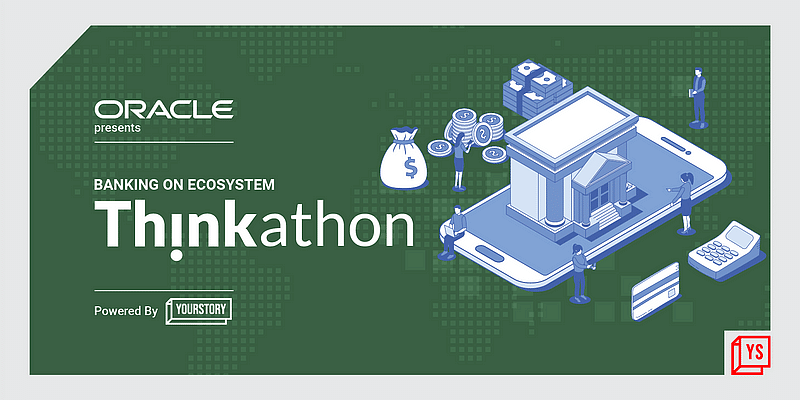Financial services are gradually shifting to an open ecosystem model, with several players participating and providing services today. Although traditional banks are gradually gravitating towards a digital-first approach, there are still several challenges to navigate when migrating to a new ecosystem. On the other hand, the growth of a large number of fintech players has heralded a new era of innovation, giving greater access to financial services within a few clicks.
As part of the Banking on Ecosystem Thinkathon organized by Oracle and YourStory, prominent leaders from the fintech space discussed the many challenges that are emerging with this transition, and how the industry can accelerate innovation with collaboration and co-development.
Some of the panelists included Brett King, Founder and Executive Chairman, Moven; Sanjay Mathew, Senior Director, Financial Services, Global Industry Strategy, Oracle; Prasad Rai, Global Strategic Clients Group – Oracle; Hitesh Sachdev, Head – Startup Engagement, Innovation, and Investments, ICICI Bank; Sunay Mruthyunjay, Senior Director, Oracle Financial Services; Jaideep Singh Ghai, VP Sales, IBSFintech India; Deepak Dube, PhD, Founder and CEO, Datanomers; and Mandar Agashe, Founder and Vice-Chairman, Sarvatra Technologies.
Digital-first: Banks, startups, and the future of banking
There is an emerging embedded ecosystem today, comprising surviving banks, tech giants, data enablers, and fintech that will take centre stage in the future of banking. Brett shed light on how it was during the pandemic that the digital channel went from being an emerging element to a required one.
“In developed economies like China, India, US, the reliance on web-based and mobile-based delivery services became critical during the pandemic. This spurred the use of mobile payments and mobile banking during COVID-19. For most customers today, digital is their primary channel and other channels like branches or ATMs are secondary, and it is still difficult for bankers to get their head around that,” he added.
There is increased consolidation happening today, which is likely to bring together an embedded ecosystem by 2025. Speaking about Bank 4.0, Brett shared that it is largely experience-led and not as product-centric. Although every industry is undergoing digitisation, banking is essentially about experience design and reduction of friction, using technology.
“2021 was a huge year for fintech; 1 in 5 VC deals were fintech deals. In Q4, $35 fintech organisations received billion dollars of funding. The fintech industry grew significantly in terms of their market capitalisation,” he shared.
Looking into the future, Brett envisioned that smart wallets will continue to innovate and offer new advice paradigms, wherein machines will outperform humans in the advice game. Today, there are also services like ‘Buy Now, Pay Later’, in which contextual credit is built into purchasing experiences.
“Smart glasses will emerge as the next computing platform, but this is possible only when you have the right data. Cryptocurrency is also a new channel. This digital-first era is all about scalability and the biggest banks of 2030 will be digital-first. We will have fintechs too; if you can’t beat incumbents, you can join them,” he added.
In all of this, Oracle’s Cloud Infrastructure, with over 40 years of experience in delivering enterprise cloud, has helped meet the needs and scale of SaaS and data platforms, mission-critical applications and enterprise customers. It also serves as a foundation for a comprehensive portfolio of infrastructure and platform cloud services, With world-class security, massive scale, predictable performance, and competitive pricing, it truly is a winner!
An example is nubank, which in June of last year raised $750 million, preparing for their IPO in December. Earlier, they had 40 million customers but by December, their customer base increased to 48 million customers. Their acquisition cost has been very low and their credit card delinquency is much lower than others in the industry, says Brett. Digital acquisition is becoming the main modality of growing financial services brands, in the post-pandemic world. This also means that incumbents are likely to face issues, if they do not make a transition to digital technologies.
The program also offers 70% off all IaaS and PaaS services for two years, delivering incredible value for scaling startups. The dedicated team of success managers, cloud architects, marketing, and sales experts help startups develop and grow their business.
In a nutshell, it creates mutually beneficial partnerships by connecting customers to exciting startups, and startups to amazing opportunities.
Building the future with partnerships
Backed by four decades of FSI solution delivery, Oracle has partnered with over 600 digital and incumbent banks in over 143 countries. Oracle’s unique value proposition as a trusted partner and technology leader enables collaboration between incumbents and fintech powered by mission-critical innovation. Plus, it has over 9,000 global customers, has carried out 26 billion transactions through its platforms, and has 180+ partners.
“We are one of the only to provide a front-to-back banking stack that is anchored on a cloud-native microservices architecture platform for agility and innovation. Oracle also has the broadest and deepest suite of cloud applications,” shared Sanjay Mathew of Oracle.
It is imperative for financial services institutions to be collaborating with ISVs and fintechs to create new applications and co-innovate with their customers, but some challenges that have surfaced include culture, bank-grade readiness, as well as issues in scaling and integration to legacy. Oracle has a unique value proposition with respect to bringing the financial institutions, the fintechs as well as the customers.
They have also launched a unique fintech startup program that provides curated innovations, and mitigation (low-security risk) is integrated into the Oracle cloud and offers access to enterprise mentorship.
Furthermore, there’s also Oracle for Startups, a global program that offers hands-on and self-service journeys to help startups grow through access to Oracle’s technology and business resources. Free and easy to join, Oracle for Startups offers cloud credits, go-to-market resources, mentoring, hands-on technical support, and access to customers.
The future of banking is collaborative
There has been a shift in banking consumer demographics, which has led to new business models and flexibility, and made alternative distribution methods critical. Incumbents need to bypass cultural differences and misconceptions in tech implementation to collaborate with fintechs.
According to Prasad, open banking has unlocked new monetisation opportunities to extend distribution to third parties and create innovative banking. These capabilities require a digital-first mindset and cloud-based APIs that can integrate and comply with the rapidly growing industry ecosystem.
Adding to this, Brett shared that for fintechs, the immediate advantage of working with banks is there’s clear differentiation in terms of CX, UX, or capabilities like data science and AI, plus one can deliver that cost-effectively.
There are also some big banks like ICICI that have always had technology at the forefront. As a digital-first bank with innovation as the core of its strategy, they believe in two approaches.
“Either you keep building a lot of things inside the bank but it has its own limitations, or the other way is to capture innovation that is happening at a fast pace in the outside startup ecosystem. So to marry the two, we created a platform to create rapid prototyping, experimentation, do more innovation, and make it the core of the bank,” explained Hitesh of ICICI Bank, adding that there are certain challenges of open APIs and data governance, but working with startups has been exciting.
Oracle Content Delivery Network (OCDN) provides all the support to various startups to run an independent, unbiased, and neutral network, which will serve as a tech layer. Citing the example of NPCI-launched UPI, he said in a similar manner, ONDC will run this network for all its stakeholders in e-commerce for them to participate and function seamlessly in their business. There are several challenges that exist — from creating a marketplace to a need for more technology players — but this is likely to evolve as we go forward.
Leveraging partnerships in the era of digital transformation
In an age of innovation, ecosystems are at play across industries, especially in one as dynamic as banking. Fintechs can help in scalability, ease, and automation which incumbent banks can leverage for continued expansion in the sector. Citing an example, Jaideep explained that both NEFT and RTGS came about in 2004-05, and nothing really has changed. When we speak about the retail clients, the ease of transaction is on the fintech banks.
“If you look at the corporate space, they still follow a traditional approach. Our systems help in the API integration with the banks and Oracle is our partner in this. We are a bank-agnostic company,” he added.
Collaboration in the cloud has allowed a rapid shift in digital capabilities in avenues such as payments to open up possibilities for seamless transactions.
Sunay elaborated that they believe in an ecosystem play, more so in banking where there is a lot of innovation happening. He added that fintechs are nimble and innovative, but banks are the ones who have an existing client base. In a nutshell, combining the two is essential and Oracle provides the required tech for both.
On the other hand, fintech can also help in scalability and ease of transaction, added Jaideep, who credited new payment channels for bringing ease of transaction to the fingertips.
“In banks, there is a strong desire to acquire new customers, and for that, you need to delight your customers. You can bring in tech, and implement it, and things that seemed impossible with brick and mortar call centres have now become a possibility,” said Deepak.
Even a decade ago, banks did not have any payment platforms, but today the reality is different. Mandar informed that 54 percent of the banks have their digital platforms hosted on Sarvatra.
“The key challenge was to ensure that these very small banks, who have no IT people or relevant knowledge to do settlements to come on to the latest digital platform. More than 100 banks in India use our UPI platform, from the smallest rural bank to the largest bank, and this was only possible because of the cloud. That’s why so many rural banks could come on board in the shortest possible time ,” he concluded.
In a nutshell, Oracle helps in connecting the dots between fintech players and traditional banks.



![Read more about the article [Funding alert] Neo banking startup StashFin raises $40M](https://blog.digitalsevaa.com/wp-content/uploads/2021/04/Imageff9v-1617515639633-300x150.jpg)
![Read more about the article [Funding alert] Edtech startup Braingroom raises Rs 1.5 Cr from IAN, Social Alpha, and Startup Oasis](https://blog.digitalsevaa.com/wp-content/uploads/2021/07/Imageetkx-1626673640042-300x150.jpg)


![Read more about the article [Funding alert] Leadership development startup PeakPerformer raises early-seed round from Antler India](https://blog.digitalsevaa.com/wp-content/uploads/2021/07/Image7a1v-1625471210240-300x150.jpg)


